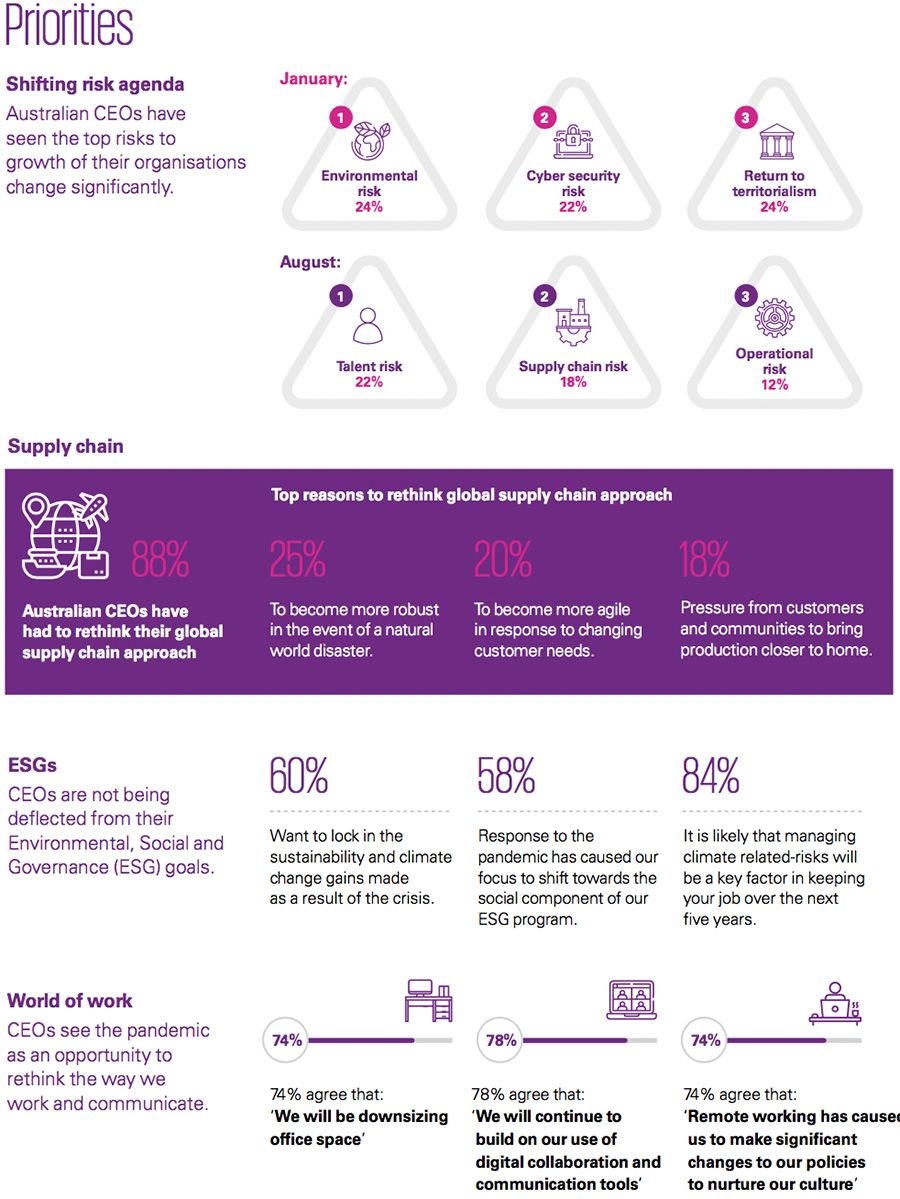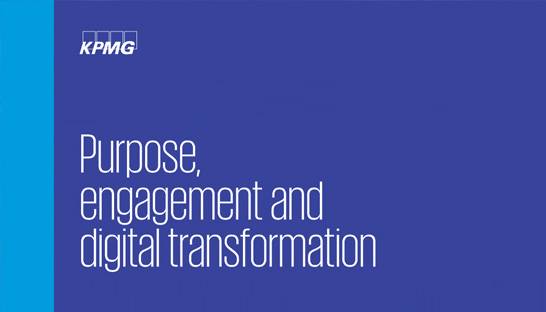Covid-19 has well and truly changed business priorities as CEOs connect with their business purpose and realize the value of digitization, among other significant shifts.
KPMG surveyed more than 300 CEOs worldwide during July and August – including 50 in Australia – building on a previous survey conducted earlier in the year of more than 1,000 global CEOs. The goal was to track the change in CEO sentiment during the crisis, and the results are remarkable.
Most notable was the push for digital transformation efforts—a trend born out of necessity. Mandatory ‘work from home’ policies in countries around the world have meant that businesses have turned to digital channels to keep their operations running. KPMG reports that more than 80% of Australian CEOs saw an acceleration in digital adoption during the crisis, across impact areas.
“It is clear that digital transformation has accelerated during the crisis. More than three-quarters of CEOs here and internationally said the crisis pushed the delivery of the digital customer experience years or months ahead, as well as accelerating the digitization of operations and the creation of digital models and revenue streams,” explained Gary Wingrove. , CEO at KPMG Australia.
According to the firm’s analysis, digital investments also make businesses feel more comfortable. Nearly three-quarters of all CEOs surveyed believe their business will grow over the next three years “because they have more control over the levers that determine it – one of the most critical being digital acceleration,” the report said.
That being said, businesses don’t realize how the world has changed under the Covid-19 paradigm. Evidence of this is the focus on business-to-business risk, which has changed considerably. As recently as January, Australian CEOs said environmental risks, cyber risks and a global return to territorialism, signaled by trade wars and tightening immigration laws, were the biggest risks.

Today, the risk profile is much more immediate, with talent, supply chain and operational risks at the fore. Talent risks barely made it into the top ten in January, but they are the most pressing concern for most businesses today. The need to cut costs has forced many to downsize their teams, putting businesses at risk of losing important people.
Similarly, at the bottom of the list earlier this year were supply chain risks, which have now catapulted to the top priorities. The lockdown caused countless disruptions to the movement of both raw materials and finished goods, and the slow reopening since then has doubled down on those issues. As mentioned earlier, businesses have had to reorganize their operations under the “new normal”, which means that CEOs are also mindful of operational risks.
The focus on immediate business survival has thrown more fundamental risks such as climate change and injustice out of focus. At the same time, KPMG notes that CEOs have not at all forgotten the threat of climate change, nor have they lost sight of other aspects of environmental, social or corporate governance (ESG).

“The seriousness with which Australian CEOs take the issue of climate change is reflected in the fact that 84 per cent of them say that managing climate-related risks will play a role in whether or not they keep their jobs in the next 5 years. To move forward, they want to double down on structural shifts that emerged during the crisis, such as less business travel: 60 percent say they want to block the climate change gains made as a result of the pandemic. More than half (58 percent) said their response to the pandemic caused them to shift their focus to the social component of their ESG program,” explained Wingrove.
So the key trends in the C-suite are digital investments, new risks and shifting priorities. Another key development KPMG has seen is that CEOs in Australia are increasingly in touch with their companies’ purpose since the start of the pandemic, more so than business leaders around the world.
Up to 90% now use their business plan as a guide for decisive and effective action, while more than 80% keep this purpose in mind when considering stakeholder requirements. More than a functional tool, business purpose is an emotional driver for leaders – 82% reported a “stronger emotional connection to their purpose since the start of the pandemic”.
At the same time, a similar share of leaders have had to introspect and reinvent their purpose to adapt to the new reality emerging from the pandemic and the new demands of consumers and stakeholders.


